1 February 2022
'We will not be silenced' Bloody Sunday 50 years on
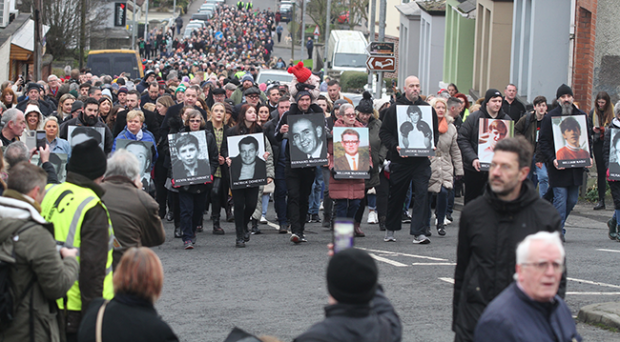
• The families’ Walk of Remembrance that traced to route of the original march
The historic milestone that was the 50th anniversary of the Bloody Sunday killings in Derry saw a series of commemoration events take place in the city over the weekend.
The main event, on Sunday 30 January and 50 years to the day of the massacre, was the families’ Walk of Remembrance that traced to route of the original march from the shops in Creggan to the Bloody Sunday monument on Rossville Street where a commemorative ceremony, attended by the families, church leaders from Catholic, Protestant, Presbyterian and Muslim faiths were represented.
For the first time in 50 years the Irish Government was officially represented with An Taoiseach Michéal Martin and Minister for Foreign Affairs Simon Coveney in attendance.
Sinn Féin President Mary Lou McDonald, accompanied by Deputy First Minister Michelle O’Neill, laid a wreath on behalf of Sinn Féin and the republican people of Ireland.
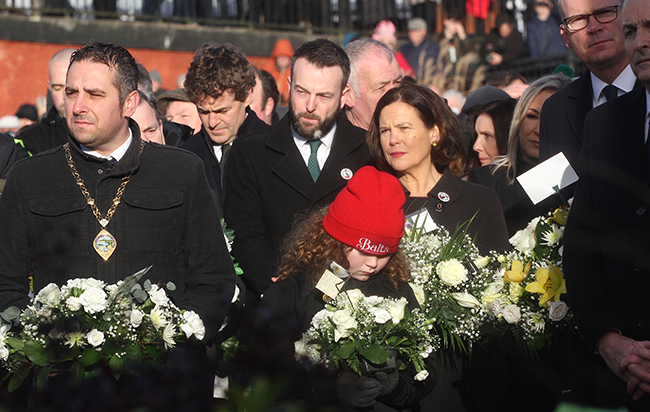
As people began to gather at Central Drive in Creggan it was clear the historical significance of the day was impacting on the mood which was clearly a sombre one with the relatives of the dead and injured, now into their third and fourth generation, expressing their anger that despite the clear evidence that British paratroopers ran amok, shooting indiscriminately, that none of the killers will ever face a trial.
In their statement, read by Mickey McKinney, the families warned the British government that “they will face them head on” if they introduce their amnesty proposals “we will not go away and we will not be silenced”.
“We had three clear demands (when the Bloody Sunday Justice Campaign was launched)”, stated McKinney, “the repudiation of the Widgery whitewash, a declaration of innocence of all the victims of Bloody Sunday and the prosecution of those responsible”.
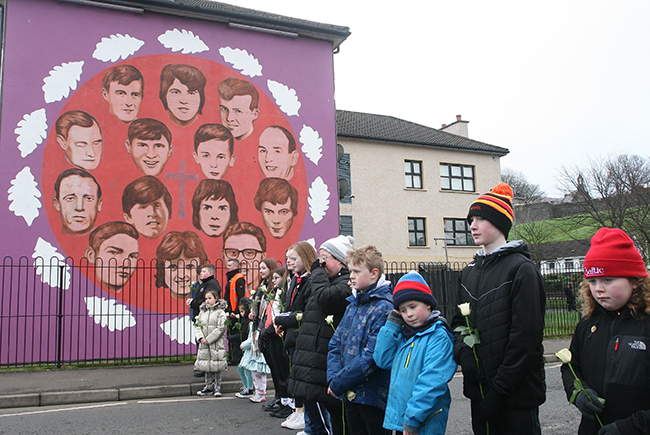
As the demonstration moved off it was led by child relatives of the dead and injured carrying white roses while behind them other relatives had photographs of the dead.
That thousands turned out to support the families should not be a surprise as the Bloody Sunday killings were the culmination of British and Unionist governments’ military strategy to break the resistance of the nationalist people of the North beginning with Battle of the Bogside and the pogroms of 1969, followed by the Falls Curfew of 1970 and a year later we witnessed the introduction of Internment, Operation Demetrius, and the unleashing of the Parachute regiment on the civilian population of Ballymurphy.
The anger and hurt is still there for thousands of nationalists across the North and the latest British government ruse, through their amnesty proposals, to protect soldiers has provoked a determination among people to see justice done.
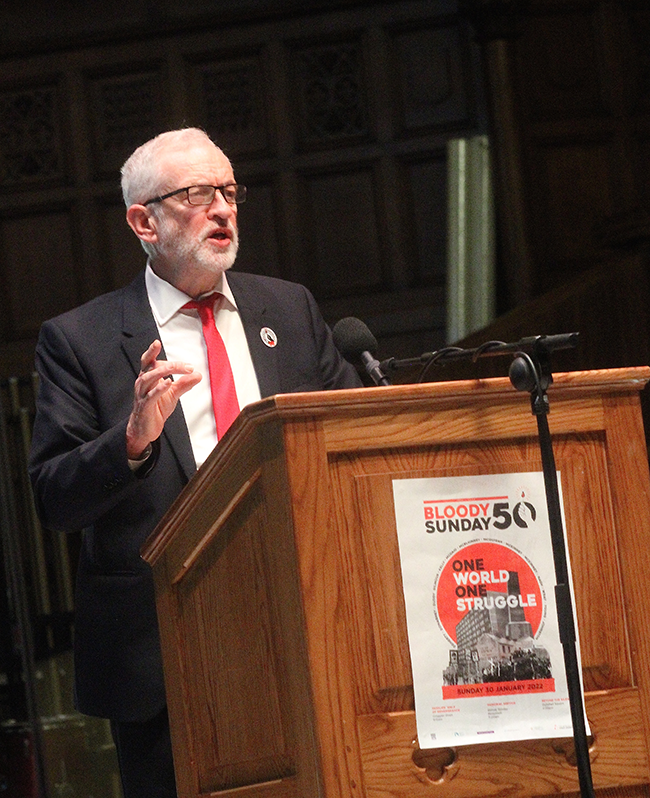
• Bloody Sunday Memorial lecture delivered by Jeremy Corbyn
Among other high-profile events that were organised over the weekend were the Bloody Sunday Memorial lecture delivered by Jeremy Corbyn as part of the One World One Struggle theme.
Greeted by a packed Guildhall audience Corbyn reminded them that those who came on to the streets of Derry in 1972 were there to oppose internment “think about that – internment without trial. That’s the stuff of dictatorship”.
The former Labour leader added “Derry is an inspiration. The Campaign for the Bloody Sunday memorial is an inspiration and to me it’s an honour to be invited here”.
Meanwhile in an event chaired by Fermanagh born actor Adrian Dunbar held in the city’s Millennium Forum President Michael D. Higgins addressed the ‘Beyond the Silence’ event.
The President paid tribute to those who fought down the years to “vindicate the memories of your loved ones” and the campaign to overturn “those forces who sought to avoid the necessary truth of what took place, and evade accountability.
“Forces that stood between you and your efforts to overturn the historic, grievous wrong of the Widgery Tribunal”.
In concluding President Higgins described Derry as “a beacon of hope and justice, of battling and succeeding against the odds”.
Fian Gerald Donaghey remembered
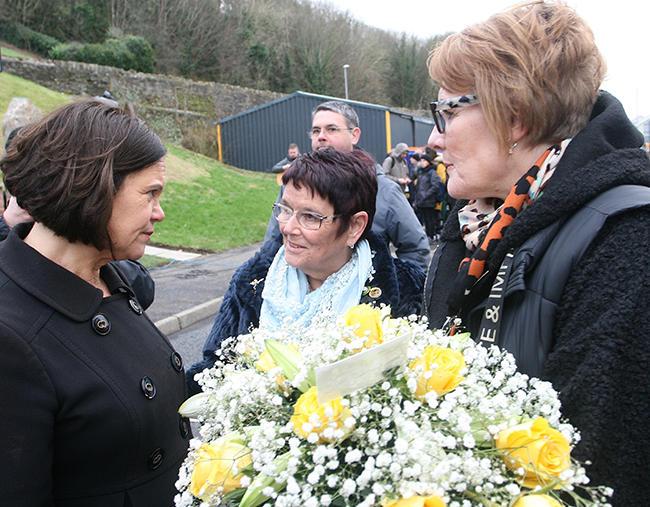
• Mary Lou McDonald with relatives of Gerald Donaghey
After the relatives walk from Creggan to the Bloody Sunday memorial, hundreds of republicans gathered at the nearby Derry Brigade 1st Battalion memorial in the Brandywellfor a ceremony in honour of young Fianna Éireann volunteer. Gerald Donaghey who was killed on Bloody Sunday.
Sinn Féin’s Mary Lou McDonald and Michelle O’Neill both attended the commemoration.
Speaking at the event was former republican prisoner Donncha Mac Ficheallaigh who attended the Bloody Sunday march with Donaghey. Mac Ficheallaigh described Donaghey’s life in the late 1960s and early 1970s as characterised by his experiences of evictions, state oppression and violence.
• • • • • • •
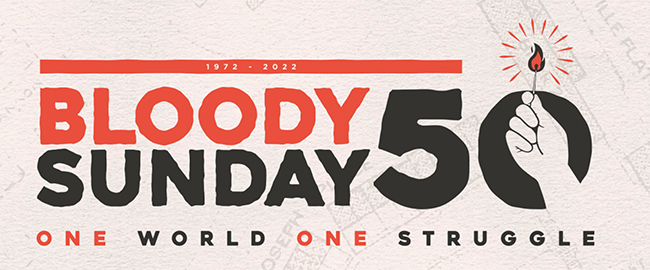
See Bloody Sunday Trust
Follow us on Facebook
An Phoblacht on Twitter
Uncomfortable Conversations

An initiative for dialogue
for reconciliation
— — — — — — —
Contributions from key figures in the churches, academia and wider civic society as well as senior republican figures





